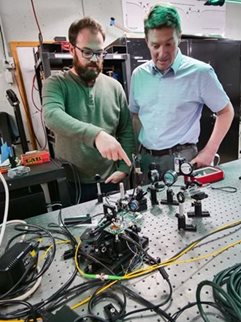2023 C.E.K. Mees Medal Winner
Get Involved
- Awards & Honors
- Community Engagement
- Early Career Professional...
- Education Outreach
- Global Policy & Affairs
- Local Section
- Students
-
Technical Groups
- Bio-Medical Optics
- Fabrication, Design and Instrumentation
- Information Acquisition, Processing, Display and Perception
- Optical Interaction Science
- Photonics and Opto-Electronics
- Quantum
- Sensing
- Technical Group Leadership Volunteers
- Technical Group Webinars
- Technical Group Search
- Technical Group Prizes
- Simulight Optics Challenge
- Volunteer
- Awards & Honors
- Community Engagement
- Early Career Professionals
- Education Outreach
- Global Policy & Affairs
- Local Section
- Students
-
Technical Groups
- Bio-Medical Optics
- Fabrication, Design and Instrumentation
- Information Acquisition, Processing, Display and Perception
- Optical Interaction Science
- Photonics and Opto-Electronics
- Quantum
- Sensing
- Technical Group Leadership Volunteers
- Technical Group Webinars
- Technical Group Search
- Technical Group Prizes
- Simulight Optics Challenge
- Volunteer
Optica Names Scott Diddams the 2023 C.E.K. Mees Medal Recipient
Optica (formerly OSA), Advancing Optics and Photonics Worldwide, is pleased to announce that Scott Diddams, University of  Colorado at Boulder, USA, has been selected as the 2023 recipient of the C.E.K. Mees Medal. Diddams is honored for pioneering innovations leading to the wide-ranging application of optical frequency combs to ultrafast lasers, optical clocks, spectroscopy, microwave synthesis, and astronomy.
Colorado at Boulder, USA, has been selected as the 2023 recipient of the C.E.K. Mees Medal. Diddams is honored for pioneering innovations leading to the wide-ranging application of optical frequency combs to ultrafast lasers, optical clocks, spectroscopy, microwave synthesis, and astronomy.
Diddams received his Ph.D. from the University of New Mexico, USA. He did postdoctoral work at JILA, the National Institute of Standards and Technology and the University of Colorado, USA and was a Research Physicist, Group Leader, and Fellow at NIST. He currently holds the Robert H. Davis Endowed Chair at the University of Colorado Boulder, where he is also Professor of Electrical Engineering and Physics.
He carries out experimental research in the fields of precision spectroscopy and quantum metrology, nonlinear optics, microwave photonics and ultrafast lasers. In 2022, he transitioned to his present position where he also assumed the role of Faculty Director of the Quantum Engineering Initiative in the College of Engineering and Applied Science. As a postdoc Diddams built the first optical frequency combs in the lab of Nobel laureate John Hall, and throughout his career, he has pioneered the use of these powerful tools for optical clocks, tests of fundamental physics, novel spectroscopy, and astronomy. 
Diddams’ research has been documented in more than 750 peer-reviewed publications, conference papers, and invited talks. Among many other awards, he has also received the Distinguished Presidential Rank Award, the Department of Commerce Gold and Silver Medals for "revolutionizing the way frequency is measured”, the Presidential Early Career Award in Science and Engineering (PECASE), the Laser Instrumentation Award, and the I. I. Rabi Award. He is a Fellow of Optica and the American Physical Society, and a Senior Member of IEEE.
Established in 1961, the Mees Medal recognizes an original use of optics across multiple fields. It honors the memory of C.E.K Mees who contributed preeminently to the development of scientific photography, and was a charter member of Optica (then OSA). The medal was endowed by the Mees family.
About Optica
Optica (formerly OSA), Advancing Optics and Photonics Worldwide, is the society dedicated to promoting the generation, application, archiving and dissemination of knowledge in the field. Founded in 1916, it is the leading organization for scientists, engineers, business professionals, students and others interested in the science of light. Optica's renowned publications, meetings, online resources and in-person activities fuel discoveries, shape real-life applications and accelerate scientific, technical and educational achievement. Discover more at: Optica.org
